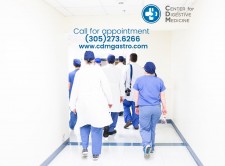Center for Digestive Medicine Answers When Patients Should See a Gastroenterologist for Acid Reflux

MIAMI, Fla., July 24, 2018 (Newswire.com) - According to The Center for Digestive Medicine, acid reflux or gastroesophageal reflux disease is a common ailment that most people have experienced at one time or another. During acid reflux, the stomach acid goes back to the esophagus, which causes severe heartburn, irritation in the chest, and breathing problems.
"The disease is most common among those who are obese or do not have an optimal diet," remarked Dr. Avila, gastroenterologist of The Center for Digestive Medicine. "Acid reflux can be prevented and managed if patients are proactive."
The disease is most common among those who are obese or do not have an optimal diet, acid reflux can be prevented and managed if patients are proactive
Mark Avila, Dr.
Heartburn is a typical symptom of acid reflux, especially after the consumption of food. There are many patients that complain about pain in their chest and severe inflammation after eating. Other symptoms include having an acidic taste in their mouth and throat, in addition to pain in their chest.
Another common symptom of acid reflux is the shortening of breath. There are a lot of people who are habitual smokers or regularly consume fast food. These habits produce excess acid which can increase the likelihood of difficulty in breathing.
"For those looking for treatments that do not involve lifelong medications to control their symptoms, or who do not desire interventional surgery, the best path forward is endoscopy. This minimally invasive procedure is performed on an outpatient basis at our offices. Patients are sedated, so it's important that they have someone to drive them home after the procedure," stipulated Dr. Avila.
In an endoscopy, patients are given a medicine to numb their throat, and a mild sedative to keep them relaxed. With these preparations, patients should not feel any pain or have trouble breathing; next, the doctor will insert the endoscope (a thin, flexible tube with a light and image sensor at the end) into their mouth and down their throat.
Afterward, the doctor may use the following techniques to repair and damage caused by the endoscopy[1]:
- Sewing or stitching affected areas, done with tiny tools
- Thermal radiofrequency, which uses heat produced by radio waves to alter the muscles
- The injection of biologically inert materials into the muscles.
The procedure takes approximately one hour.
About the Center for Digestive Medicine:
The Center for Digestive Medicine is the premier gastroenterology and hepatology (liver disease) practice serving the Miami-Dade, Florida area that comprises three physicians and three ARNP’s with a clinic and an Office-based endoscopy center within the same location for your convenience. Our providers utilize the most advanced equipment, current techniques, and medications to treat all aspects of gastroenterology related diseases including but not limited to: colon cancer screening, treatment of disease of the liver and pancreas, management of GERD, inflammatory bowel syndromes such as Chron's and ulcerative colitis, and irritable bowel syndrome. The Center for Digestive Medicine is perfect for those looking for a gastroenterologist in South Miami.
Citations:
[1] "Endoscopic Treatment for GERD". Dartmouth-Hitchcock. https://www.dartmouth-hitchcock.org/gi/endoscopic_treatment_for_gerd.html . Accessed July 2018.
Source: Center for Digestive Medicine